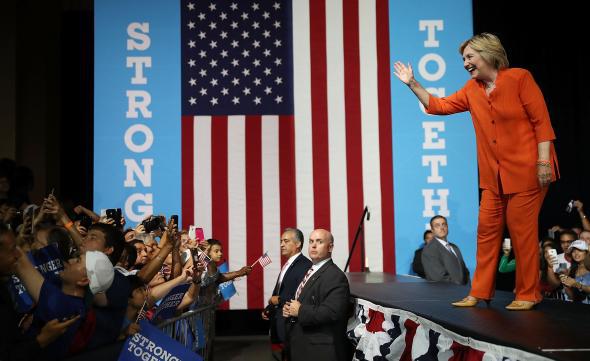Hillary Clinton on Friday did something every major party’s presidential nominee has done since 1976, with the sole exception of the man she is currently running against: She released her tax returns. The top-line numbers: Hillary and Bill Clinton earned a combined $10.6 million last year, roughly $6 million of which came from speaking fees paid by corporations and other organizations. The couple paid a federal tax rate of 34.2 percent in 2015, which climbed to 43.2 percent if you factor in what they paid in state and local taxes. The Clintons also donated roughly a tenth (9.8 percent) of their annual income to charity.
The campaign posted her 2015 returns and those of her running mate, Tim Kaine, on her website midday Friday, along with past returns for both candidates dating back roughly a decade. It will take some time for reporters and other interested parties to dig through them, but the most important thing right now is that Clinton and Kaine are giving everyone the chance to do so.
The release of a presidential candidate’s tax returns is a political tradition that dates back to the days of Richard Nixon declaring, “I’m not a crook,” a remark that referred not to Watergate but instead to rumors of tax avoidance—which turned out to be true. The release isn’t just for show, either. It serves an important civic purpose, which makes Donald Trump’s ongoing refusal to release his own a legitimate issue, albeit one not nearly as immediately sensational as the controversies he prefers to create for himself multiple times per week.
By making public his or her tax returns, a candidate provides valuable information to the very people they are asking to elect them to the highest office in the land, including how they make their money, how much they donate to charity, and whether they have any potential conflicts of interest—i.e., answers to some of the very questions that Trump either won’t answer, won’t back up with any actual evidence, or has lied about during his campaign. (Those financial disclosures candidates file with the Federal Election Commission earlier in their campaign, meanwhile, can be so vague that they are often nearly worthless, particularly for the ultra-rich like Trump.) Instead, Team Trump maintains that the candidate can’t release his returns because he’s being audited—something that doesn’t actually affect his ability to release his tax returns—and that, anyway, we should all really just trust him and move on with our lives.
Of course, the occasional peek the public has gotten at Trump’s old tax returns offers one possible reason why the GOP nominee is ignoring this political tradition. Trump paid no—as in zero—federal taxes in 1978 and 1979 thanks to a developer-friendly trick that allowed him to report negative income in those years. It’s not inconceivable that his more recent returns look similar, which would put Trump in an even more awkward position than he is in now. Either he is not nearly the master of business he fancies himself to be or he is no better than the corporate executives that he claims “get away with murder” by using every tax loophole they can find. Regardless of the reasons, though, Trump appears to believe that releasing his returns would do more political damage to his already battered campaign than withholding them will. That alone is a reason for voters to worry.
